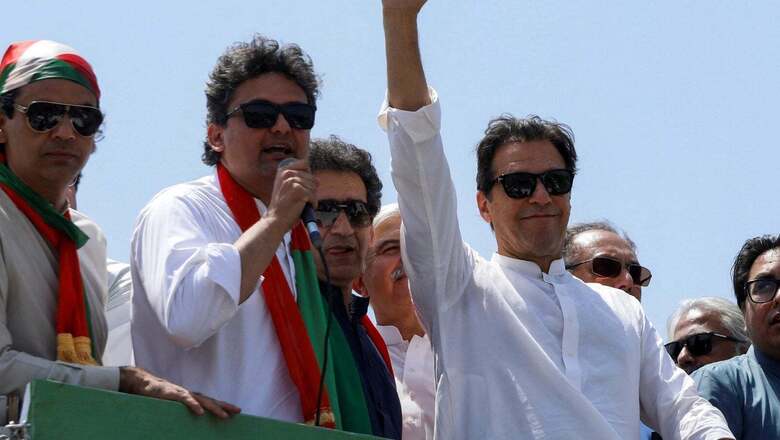
views
After all, it is Pakistan we are talking about, where assassinations of and attacks on top political leaders – from Liaquat Ali Khan to Benazir Bhutto – have never been uncovered in a transparent and credible investigation that was widely accepted by the people of the country. The who, what, why of the attack on Khan will, therefore, always remain mired in controversy and counterfactuals. Quite frankly, more than who was behind the attack, its aftermath – the political repercussions and implications — are more important and interesting.
There are multiple theories, all plausible, about who could have targeted Khan.
There is the ‘false flag’ theory, according to which it was a staged drama carried out by Khan and his cronies to create a situation in which he is able to mount unbearable pressure on the government and the military establishment to concede to his two main demands – early general elections and appointment of the next army chief with his concurrence.
The second theory is that he was targeted by the military establishment, which is infuriated by the invective hurled their way by Khan and his defiance of them. But if indeed it was the military then would an outfit like the ISI, which has so much experience and expertise in assassinations, carry out such a clumsy operation in which the alleged assailant has been arrested?
What is more, Khan has been targeting the military establishment for over six months. And yet, the military has been unable to shut him up. The reason for that is that like rest of Pakistan, the Pakistan Army is also divided right down the middle on the issue of Imran Khan. The Army leadership fears that if it acts against Khan, it could result in a blowback – an uprising among Khan’s supporters and a rebellion within the rank and file of the Army – that will be extremely difficult to handle. If because of this, the Army desisted from doing anything against Khan, would they have carried out this attack? Unlikely, but that is not what Khan’s cult is thinks.
The third theory is that the government was behind the attack. Interior minister Rana Sanaullah has been threatening to crush Khan. Rana has no love lost for him because Khan and his cronies booked Rana in a false narcotics case to fix him. Rana has publicly threatened to throw Khan in jail and warned that if Khan tried to disturb the peace in Islamabad, there will be terrible consequences. But neither Rana Sanaullah, nor his boss Prime Minister Shahbaz Sharif are people who will hire assassins to bump off their political rival. Fixing them through legal processes is one thing, physically eliminating them is quite another. Add to this the fact that the attack took place in Punjab, a province which is ruled by Khan’s party in coalition with Pervaiz Elahi’s faction of PMLQ. The security of the March was the responsibility of the provincial government. They were calling the shots. Neither the Prime Minister nor the federal interior minister have any say in what happens in Punjab. But again, try explaining this to the zombies who form the Khan cult. Both Rana and Sharif are hate figures for the cult and they are quick to imagine the worst of them.
The fourth theory is that it was the handiwork of a deranged individual. Pakistan has more than its share of crazies. There is already a confession from a suspect who claims he carried out the attack because he was incensed over the music blaring from Khan’s container, which continued to play even after the calls to prayers (azaan). Similar crazies have in the past targeted people like the former interior minister and currently planning minister Ahsan Iqbal who was shot by an activist of the Barelvi radical Islamist group Tehrik-e-Labbaik.
Yet another possibility is that some militant group – TTP, ISK, ISPP etc. – was responsible. They have the reach and the reason for such an attack. They know that Pakistan is a powder keg waiting to explode and all it needs is a spark. The resulting chaos exponentially expands the space for them to operate. There is also the theory that Khan has so polarised Pakistan and made so many enemies that someone decided to end this fitna (someone who causes anarchy and unrest in society).
Finally, it could be the handiwork of agent provocateurs who want to see Pakistan descend into chaos.
With such a long list of suspects, getting to the bottom of the attack is almost impossible, more so because the crime scene has been disturbed and defiled to a point where any investigation for clues or reconstructing the events has become meaningless. There are conflicting accounts from ‘eye-witnesses’ making it look like a Pakistani version of Rashomon – Was there one shooter or multiple shooters? Was there shooting from the rooftops or only from the ground? Was there any firing from Khan’s container? Were the people injured by bullets fired by the shooter or by accidental firing when the shooter was being apprehended? So on and so forth.
Regardless of how the investigations proceed and what they unveil, it is the politics that follows that will decide the fate of Pakistan. Imran Khan clearly now has the wind behind his sails. He will play to the gallery and milk the attack on him to the hilt for pushing his politics forward. He has already nominated the Prime Minister, interior minister and the ISI Maj Gen in-charge of counter intelligence and political management as the prime suspects. He is now demanding that they be removed from office otherwise he will launch a nationwide movement. Khan will also now decide whether to end his Long March or to press ahead with it. He knows that the military and the government are on the backfoot and under tremendous pressure. But he also knows that if they don’t wilt under the pressure, then Khan needs blood on the streets to force things in his favour.
Going forward, Khan will become even more strident in his rhetoric. He will push things right to the brink, and perhaps even beyond. For Khan the demagogue, his ego is more important than anything else. There is no way he will or can back down from the pole he has climbed. But the problem is that there is also no way that the government or the military establishment can give in to his demands and tantrums. To do so would be to write their own political epitaph. The military will not be averse to a tactical retreat from the political domain, but not if it means giving in to someone like Khan, who is dividing the military, politicising it and trying to make it into his ‘Tiger Force’. The military is also afraid of the irretrievable damage Khan will do to Pakistan if he comes back to power. Khan has ruined Pakistan’s economy, and her relations with countries like Saudi Arabia, China and the US, all of whom Pakistan depends on for its economic survival. At a time when Pakistan economy is on the brink of an economic and political meltdown, the last thing the army wants is to see Khan back in power. The ruling coalition is also unlikely to agree to any of Khan’s demands. Their political and even physical survival demands resisting Khan.
The scene is therefore set for an epic clash. Something is going to give, and very soon. What follows could be chaos, civil war-like situation, a military putsch, which is then resisted by political forces and people. Perhaps it might sound like a doomsday warning, but we might just be seeing the beginning of the unravelling of the Pakistani state.
The writer is Senior Fellow, Observer Research Foundation. The views expressed in this article are those of the author and do not represent the stand of this publication.
Read all the Latest Opinions here




















Comments
0 comment